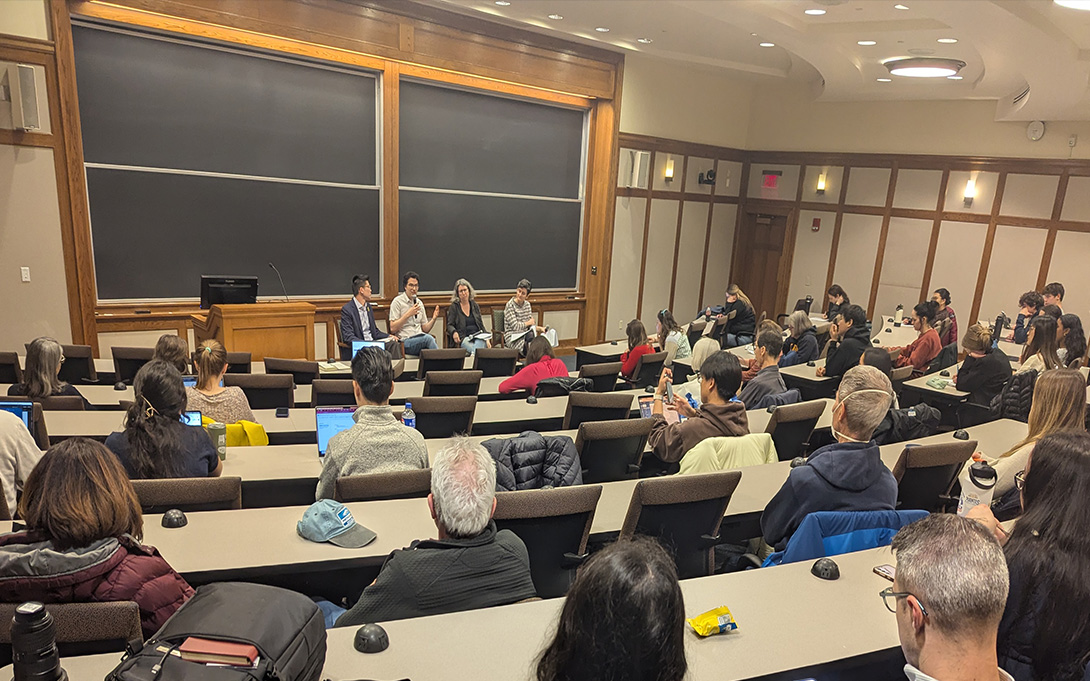
“Executive orders can't overrule statutes, so that’s a mystery legally,” according to Michigan Law Professor Margo Schlanger. She was addressing the legal and rhetorical attacks the Trump administration has made against birthright citizenship. Schlanger joined a panel -- Current and Historical Challenges to Birthright Citizenship -- that included Ford School Professor Charlotte Cavaille, Samuel Erman, professor of law and history, and Ian Shin, professor of social and cultural history and Asian American studies. They had consensus that this administration’s position on birthright citizenship runs against legal statutes, a constitutional amendment, and legal precedent. Should it make its way through the judicial system, it should be “a pretty easy case,” said Schlanger.
The first clause of the 14th Amendment says, “All persons born or naturalized in the United States, and subject to the jurisdiction thereof, are citizens of the United States and of the State wherein they reside.” Schlanger explained that the current administration is using an “aggressive reading” of the 14th Amendment, to say that babies born on U.S. soil should not be “citizens because the visitors [their parents] should not be understood as subject to the jurisdiction thereof” while they are in the U.S.
Considering the history of the 14th Amendment, Erman said, “This is a rare moment where there actually is a really clear historical answer, and it turns out that it’s averse to the administration.” The panelists agreed that the intent of the 14th Amendment when it was created was to let the children of immigrants obtain citizenship. Shin explained that the senators drafting the 14th Amendment did discuss immigrants and their children and, at the time, “the California Senator John Conness said ‘we are ready to accept the provision proposed in this constitutional amendment that children begotten of Chinese parents in California shall be citizens.’”
The professors also discussed the exclusions under the clause, “subject to the jurisdiction thereof.” Schlanger said that while the 14th Amendment excludes the children of invading soldiers from obtaining birthright citizenship and the Trump administration has talked about undocumented immigrants as invaders, “They haven’t been pushing so far in the legal papers that this is an invasion thing.” The reason for this, she says, is that the argument is “just a loser legally. These are not, in fact, soldiers,” so the administration is attempting to find other legal grounds to exclude these immigrants.
The panel also compared the current administration’s actions with historical attempts to prevent certain groups from obtaining birthright citizenship. Shin highlighted the “very long history of racist attempts to restrict not only who is allowed to enter the United States and become a citizen but who we imagine to be Americans.” They talked extensively about the case of United States v. Wong Kim Ark, a Chinese American who had obtained birthright citizenship before the passage of the 1882 Chinese Exclusion Act and was detained in 1885. The case was decided in favor of Wong Kim Ark, and the opinion of this court, and the faculty panel, was that “subject to the jurisdiction thereof” applied to every individual within the country, even individuals who are visitors or lack documentation–with very few exceptions, mostly for foreign diplomats.
Shin emphasized that we need to “think about historically how that system was created, and what that purposefully left out and how those folks are left with very few options,” especially today for immigrants from the Western Hemisphere. On a more hopeful note, Erman explained that “the 14th amendment, in particular, was about saying there’s a bunch of policies out there that are popular out there in certain parts of the country and were popular in the not-so-distant past that we don’t want to ever be on the table again,” including policies taking away birthright citizenship.
